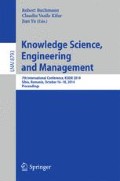Abstract
As an emerging concept, Knowledge Management (KM) has a great impact on organization and organizational performance. On the other hand, DMAIC is a well known methodology, used for solving organizational problems through Six Sigma projects.The main purpose of this study is to assess the impact of newly proposed DMAIC-KM integrated methodology in executing Six Sigma projects. For assessment, four Six Sigma projects have been executed using DMAIC-KM methodology within an airbag manufacturing unit. Afterward, the Opinion and Perception have been collected from the Project participant’s through conducting a quantitative survey regarding the Organizational benefits achieved after executing the DMAIC-KM methodology. The results revealed that the participant’s have expressed positive impression on improvement of different organizational measures. Therefore, this study would help to motivate the management of different companies to apply DMAIC-KM methodology in order to enhance their organizational performance.
Access this chapter
Tax calculation will be finalised at checkout
Purchases are for personal use only
Preview
Unable to display preview. Download preview PDF.
References
Mehrjerdi, Y.Z.: Six-Sigma: Methodology, tools and its future. Assembly Automation 31(1), 79–88 (2011)
Lee, T.Y., Wong, W.K., Yeung, K.W.: Developing a readiness self-assessment model (RSM) for Six Sigma for China enterprises. International Journal of Quality & Reliability Management 28(2), 169–194 (2011)
Karthi, S., Devadasan, S.R., Murugesh, R., Sreenivasa, C.G., Sivaram, N.M.: Global views on integrating Six Sigma and ISO 9001 certification. Total Quality Management & Business Excellence 23(3), 237–262 (2012)
Firka, D.: Six Sigma: An evolutionary analysis through case studies. The TQM Journal 22(4), 423–434 (2010)
Dahlgaard, J.J., Dahlgaard-Park, S.M.: Lean production, six sigma quality, TQM and company culture. The TQM Magazine 18(3), 263–281 (2006)
Chang, S.-I., Yen, D.C., Chou, C.C., Wu, H.C., Lee, H.P.: Applying Six Sigma to the management and improvement of production planning procedure’s performance. Total Quality Management & Business Excellence 23(3), 291–308 (2012)
Stevens, D.E.: The Leveraging Effects of Knowledge Management Concept. In: the Deployment o Six Sigma in a Health Care Company. Ph.D. Thesis, Walden University, USA (2006)
Zou, X.P.T., Lee, W.B.: A study of knowledge flow in Six Sigma teams in a Chinese manufacturing enterprise. The Journal of Information and Knowledge Management Systems 40(3/4), 390–403 (2010)
Llorens- Montes, F.J., Molina, L.M.: Six Sigma and management theory: processes, content and effectiveness. Total Quality Management & Business Excellence 17(4), 485–506 (2006)
Grant, R.: Prospering in dynamically competitive environments: Organizational capability as knowledge integration. Strategic Management Journal 17, 109–122 (1996)
Becera-Fernandez, I., Sabherwal, R.: Individual, group and organizational learning. In: Becera-Fernandez, I., Leidner, D. (eds.) knowledge Management: An Evolutionary View, pp. 13–39. M.E. Sharpe, Armonk (2008)
Lanyon, S.: At Raytheon Six Sigma Works, Too, To Improve HR Management Process. Journal of Organizational Excellence 22(4) (Autumn 2003)
Yeung, R.: Integrating Six Sigma with Knowledge Management, Lecture slides in City University Hong Kong, (2004), http://www.sixsigma.org.hk (accessed date: October 12, 2012)
Paladino, R.E., Newman, K.B.: Integrating Balanced Scorecard, Six Sigma and Knowledge Management to Drive Value at Crown Castle. APQC (2004), http://www.apqc.org (accessed date: September 12, 2012)
Wu, C., Lin, C.: Case study of knowledge creation facilitated by Six Sigma. International Journal of Quality & Reliability Management 26(9), 911–932 (2009)
Herbert, N.: Merging Knowledge Creation Theory with the Six-Sigma Model for Improving Organizations: The Continuous Loop Model. International Journal of Management 28(2) (2011)
Kifor, C.V., Baral, L.M.: An integrated DMAIC-Knowledge Management conceptual model for Six Sigma quality management. In: 6th International Conference on Manufacturing Science and Education MSE, Sibiu, Romania, pp. 12–15 (2013)
Nonaka, I., Toyama, R., Konno, N.: SECI, Ba and leadership: A unified model of dynamic knowledge creation. Long Range Planning 33(1), 5–34 (2000)
Lewin, K.: Action Research and Minority Problems. Journal of Social Issues 2(3), 34–46 (1946)
Cronemyr, P.: Six Sigma Management, Action Research with some Contributions to theories and methods, Ph.D. Thesis (2007)
Orbak, A.Y.: Shell scrap reduction of foam production and lamination process in automotive industry. Total Quality Management and Business Excellence 23(3), 314–325 (2012)
Author information
Authors and Affiliations
Editor information
Editors and Affiliations
Rights and permissions
Copyright information
© 2014 Springer International Publishing Switzerland
About this paper
Cite this paper
Baral, L.M., Kifor, C.V., Bondrea, I. (2014). Assessing the Impact of DMAIC-Knowledge Management Methodology on Six Sigma Projects: An Evaluation through Participant’s Perception. In: Buchmann, R., Kifor, C.V., Yu, J. (eds) Knowledge Science, Engineering and Management. KSEM 2014. Lecture Notes in Computer Science(), vol 8793. Springer, Cham. https://doi.org/10.1007/978-3-319-12096-6_31
Download citation
DOI: https://doi.org/10.1007/978-3-319-12096-6_31
Publisher Name: Springer, Cham
Print ISBN: 978-3-319-12095-9
Online ISBN: 978-3-319-12096-6
eBook Packages: Computer ScienceComputer Science (R0)

